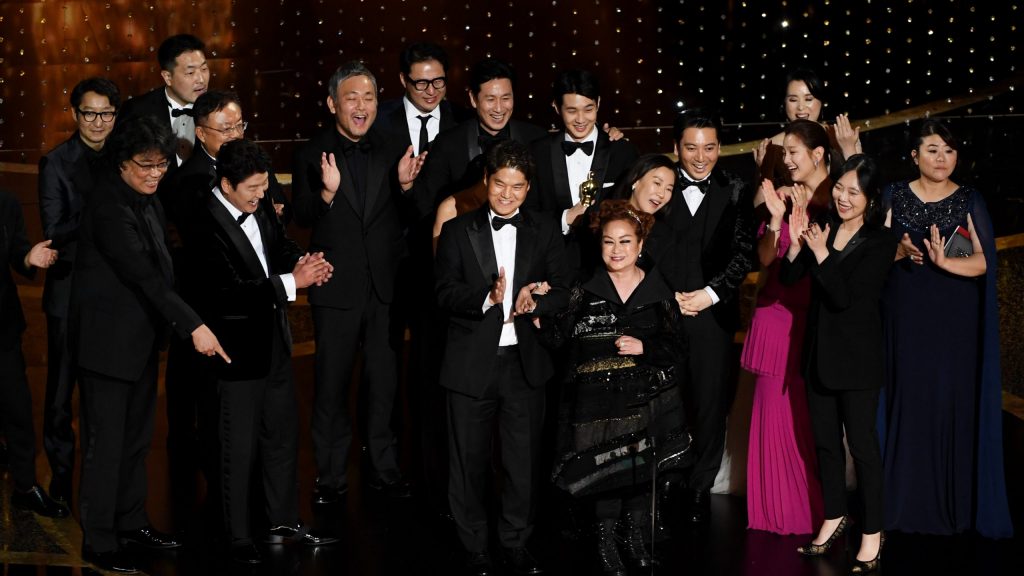Director Bong Joon Ho’s blockbuster “Parasite” won four Oscars Sunday night, including Best Picture, earning itself a place in history for being the first foreign language film to win the Academy Award for Best Picture.
But more than just making history, the South Korean drama’s win gave Hollywood what it needed most at this moment: a breath of artistic fresh air in today’s politicized and polarized climate.
The South Korean drama, which began the evening with six nominations, also won three other titles (Best International Film, Best Director, and Best Original Screenplay) for a total of four Oscars, more than any other film this year. Described by the Los Angeles Times as a “darkly comic class satire about two families, one rich and one poor,” the film has become the highest grossing South Korean film in history since its October 2019 release.
As many other presentations and speeches made clear throughout the night, much of Hollywood has grown disenchanted with society and has a habit of politicized messaging. But when the cast and crew of an international film stood in the spotlight, the world saw something of universal appeal: unvarnished love for art with a classy touch of humility.
In a culture that is obsessed with image and reputation, Hollywood has all too easily become a standard bearer of political correctness and virtue signaling. As a result, its arenas (like the Oscars) often become an echo-chamber of unoriginal jokes and speeches that lament the agreed-upon injustices of the day, leaving everyone satisfied that they are woke enough to know what is wrong with America.
In his acceptance speech for Best Lead Actor, Joaquin Phoenix sounded off a litany of PC crusades, from “queer rights” to “animal rights.” While he lamented problems of division, it was clear that none of the issues he mentioned were divisive among the crowd he addressed.
Earlier in the evening, action movie stars Sigourney Weaver, Brie Larson, and Gal Gadot took the stage in glamorous garb and tried to sell the case that the life of a woman in Hollywood is an onerous nightmare. Their plastered smiles and bad punchlines were so stilted and forced that even Gadot lacked her Wonder Woman poise. The PC messaging trumped the artistic moment, and so it all fell flat.
But each time Bong Joon Ho ascended the stage to accept one of many awards (for a film which, ironically, had one of the most profound social commentaries found in this year’s nominees), he was concerned with neither his personal image nor a political agenda. He looked like a young boy who had just received the shiny new bike he had always wished for but never expected to get. His gratitude lifted the tone of the whole evening.
When he accepted the award for Best Director, Ho’s self-effacing words left scores of people visibly moved. A smile of confusion and delight spread across his face, he explained how Martin Scorsese had inspired him while he was studying cinema and never expected to win the award over him. With a heartfelt gesture to the director he emulated, Bong moved the entire crowd to stand and applaud for Scorsese rather than himself. Moved almost to tears, Scorsese stood to applaud Bong and encourage the crowd to direct their attention back to the winner.
The sense of wonder didn’t fade as the night went on, with the entire cast and crew of “Parasite” receiving the surprise of their lifetimes: the Best Picture award. This time, Bong let his producer Kwak Sin-ae take the microphone, who, laughing and teary eyed, stated that “We never imagined this to ever happen. We are so happy.”
At that moment, the stage was not a platform for a message. It was not a time to score points by slamming political adversaries or perceived injustices. It was only a place to celebrate art and recognize the audience who embraced their story.
“I express my deepest gratitude and respect for all the members of the Academy for making this decision,” Kwak said simply.
The reactions were so uplifting that the crowd couldn’t get enough; when the stage lights first dimmed to end Sin-ae’s speech, they started chanting “Up! Up!”, demanding that the spotlights be turned on again so that the “Parasite” team could continue to soak in their moment.
A culture of political correctness can quickly become convoluted and self-aggrandizing, but Bong Joon Ho and the “Parasite” team taught us that there is beauty in simple joy and humility. These winners did not feel the need to turn their awards into statements; they simply enjoyed the honor of being recognized beyond their wildest dreams, and in their humble surprise, they highlighted the others who had inspired them, led them, and helped them improve.
When Hollywood closes in on itself and its agendas, it becomes repetitive, unoriginal, and boring. But thanks to the humble joy that this foreign film cast and crew brought to the Dolby Theater Sunday night, “Parasite” may just have infected Hollywood with a dose of the kind of stuff the best art is supposed to inspire in us.

